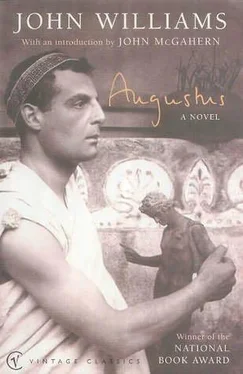John Williams - Augustus
Здесь есть возможность читать онлайн «John Williams - Augustus» весь текст электронной книги совершенно бесплатно (целиком полную версию без сокращений). В некоторых случаях можно слушать аудио, скачать через торрент в формате fb2 и присутствует краткое содержание. Жанр: Историческая проза, на английском языке. Описание произведения, (предисловие) а так же отзывы посетителей доступны на портале библиотеки ЛибКат.
- Название:Augustus
- Автор:
- Жанр:
- Год:неизвестен
- ISBN:нет данных
- Рейтинг книги:3 / 5. Голосов: 1
-
Избранное:Добавить в избранное
- Отзывы:
-
Ваша оценка:
- 60
- 1
- 2
- 3
- 4
- 5
Augustus: краткое содержание, описание и аннотация
Предлагаем к чтению аннотацию, описание, краткое содержание или предисловие (зависит от того, что написал сам автор книги «Augustus»). Если вы не нашли необходимую информацию о книге — напишите в комментариях, мы постараемся отыскать её.
Augustus — читать онлайн бесплатно полную книгу (весь текст) целиком
Ниже представлен текст книги, разбитый по страницам. Система сохранения места последней прочитанной страницы, позволяет с удобством читать онлайн бесплатно книгу «Augustus», без необходимости каждый раз заново искать на чём Вы остановились. Поставьте закладку, и сможете в любой момент перейти на страницу, на которой закончили чтение.
Интервал:
Закладка:
OCTAVIUS CAESAR: My dear and old friends, I take this occasion to present our guest. From our friend and ally in the East, that Herod who governs Judaea, comes the emissary Nicolaus of Damascus, who also is a scholar and philosopher of much distinction, and therefore doubly welcome in the company which graces my home upon this happy occasion. I am sure that he would wish to give you the greetings of Herod himself.
NICOLAUS: Great Caesar, I am humbled by your hospitality and honored beyond my merits to be included in the company of your renowned and intimate friends. Herod does, indeed, wish me to convey to you and your colleagues in the destiny of Rome his respectful greetings. The kindness and mutual affection which I have observed this evening persuade me that I shall be allowed to speak to you openly ofthat mission I have come to fulfill from the ancient land of Judaea. As a token of the boundless respect in which he holds Octavius Caesar, my friend and master Herod has given me leave to travel to Rome in order to speak to that man who has led Rome into the light of order and prosperity, and who has united the world. In honor ofthat Caesar, who is my host, I propose to write a Life, which will celebrate his fame to all the world.
OCTAVIUS CAESAR: AS flattered as I am by this gesture of my good friend Herod, I must protest that my accomplishments do not merit such attention. I cannot persuade myself that the considerable talents which you, our new friend Nicolaus, possess should be put to so unimportant a purpose. Therefore, for the sake of those more significant tasks of learning which you might perform, and for the sake of my own sense of propriety and yet with all my gratitude and friendship, I must attempt to dissuade you from this unworthy task.
NICOLAUS: Your modesty, great Caesar, does honor to your person. But my master Herod would have me protest that modesty, and remind you that, great as your fame is, yet there are those in distant lands who have heard of your great accomplishments only by word of mouth. Even in Judaea, where the Latin tongue is used only by the educated few, there are those who do not know of your greatness. Thus were a record of your deeds put into that Greek language which all know, then would Judaea and much of the Eastern world be cognizant even more deeply of their dependence upon your beneficent power; and therefore might Herod more firmly rule, under your auspices and wisdom.
AGRIPPA: Great Caesar and dear friend, you have heeded my counsel before; I beseech you to do so again. Be persuaded by Nicolaus's eloquent request, and forsake your modesty in the interest of that which you must love more than your own person-that Rome, and the order which you have bequeathed her. The admiration which men in distant lands will give to you, will become love for the Rome that you have built.
LIVY: I shall make bold to add my voice to the persuasions you have heard. I know the reputation of this Nicolaus who stands before us now, and you could not put your fame in more trustworthy hands. Let mankind repay in some small measure that which you have given in such abundance.
OCTAVIUS CAESAR: I am at last persuaded. Nicolaus, you have the freedom of my house and you have my friendship. But I would beg you to confine your labors to those matters which have to do only with my acts in regard to Rome, and do not trouble your readers with those unimportant things that might have to do with my person.
NICOLAUS: I accede to your wishes, great Caesar, and shall endeavor by my poor efforts to do justice to your leadership of the Roman world.
… And thus, my dear Strabo, was the matter accomplished; Herod will be pleased, and I flatter myself by imagining that Octavius (he insists that I use the familiar address to him, in the intimacy of his house) has full confidence in my abilities to perform this work. You understand, of course, that the foregoing account has been submitted to the formal necessities of the dialogue in which I have cast it; the actual conversation was a good deal more informal and more lengthy; there was much bantering, all quite good-natured; Horace made jokes about Greeks who bore gifts, and asked if I intended to compose my work in prose or in verses; the vivacious Julia, who teases her father constantly, informed me that I could write anything I wanted, since her father's Greek was such that he could easily take an insult as a compliment. But I have, I believe, captured in my account the essence of the matter; for however these people make jokes with each other, there is a kind of seriousness going on-or at least, so it seems to me.
Besides, in order to take further advantage of my stay here (which promises to be a lengthy one), I have projected a new work beyond the Life of Octavius Caesar, which Herod has commissioned. It shall be called "Conversations with Notable Romans," and I expect that what you have read will be a part of it. Does it strike you as a feasible idea? Do you think that the dialogue is a suitable form in which to cast it? I shall await your advice, which I treasure as much as always.
VI. Letter: Terentia to Octavius Caesar, in Asia (20 B. c.)
Tavius, dear Tavius-I say our name for you, but you do not appear. Can you know how cruel your absence is? I rail against your greatness, which calls you away and keeps you in a country that is strange and detestable to me, because it holds you as I cannot. I know that you have told me that rage against necessity is the rage of a child; but your wisdom has fled from me with your body, and I am a restless child until you return.
How could I have been persuaded to let you go from me, who could not be happy for even a day outside your presence, once you had loved me? The scandal, you said, if I followed you-but there can be no scandal where there is common knowledge. Your enemies whisper; your friends are silent; and both know you are above the customs that others find necessary to lead orderly lives. Nor would there have been harm to anyone. My husband, who is my friend as well as yours, does not have that pride of possession that a lesser man might have; from the beginning it was known between us that I would have lovers, and that Maecenas would go where his tastes led him. He was not a hypocrite then, nor is he now. And Livia seems content with things as they are; I see her at readings, and she speaks to me civilly; we are not friends, but we are pleasant to each other. On my part, I am almost fond of her; for she chose to relinquish you, and thus you became mine.
Are you mine? I know that you are when you are with me, but when you are so far away-where is your touch, that tells me more than I have known before? Does my unhappiness please you? I hope it does. Lovers are cruel; I would almost be happy, if I could know that you are as unhappy as I am. Tell me that you are unhappy, so that I may have some comfort.
For I find no comfort in Rome; all things seem trivial to me now. I attend those festivals required of me by my position, the rituals seem empty; I go to the Circus, I cannot care who wins the races; I go to readings, my mind wanders from the poems read-even those of our friend Horace. And I have been faithful to you, all these weeks-I would tell you so, even if it were not true. But it is true; I have been. Does that matter to you?
Your daughter is well and is pleased with her new life. I visit with her and Marcus Agrippa once or twice a week. Julia seems pleased to see me; we have become friends, I believe. She is very heavy with child now, and seems proud of her impending motherhood. Would I want a child by you? I do not know. What would Maecenas say? It would be another scandal, but such an amusing one!… You see how I chatter on to your memory, as I used to do to your presence.
There is no gossip amusing enough to pass on to you. The marriages that you encouraged before you left Rome have at last taken place. Tiberius, it seems, has given up his ambitions, and is wed to Vipsania; and Julius Antonius is wed to Marcella. Julius seems happy that he is now officially your nephew and a member of the Octavian family, and even Tiberius seems grumpily content-even though he knows that Julius's union with your niece is more advantageous than his own marriage to one of Agrippa's daughters.
Читать дальшеИнтервал:
Закладка:
Похожие книги на «Augustus»
Представляем Вашему вниманию похожие книги на «Augustus» списком для выбора. Мы отобрали схожую по названию и смыслу литературу в надежде предоставить читателям больше вариантов отыскать новые, интересные, ещё непрочитанные произведения.
Обсуждение, отзывы о книге «Augustus» и просто собственные мнения читателей. Оставьте ваши комментарии, напишите, что Вы думаете о произведении, его смысле или главных героях. Укажите что конкретно понравилось, а что нет, и почему Вы так считаете.











